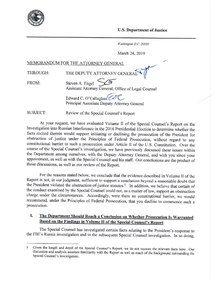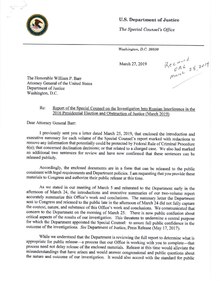Barr letter
The Barr letter is a four-page letter sent on March 24, 2019, from Attorney General William Barr to leaders of the House and Senate Judiciary Committees purportedly detailing the "principal conclusions" of the Mueller report of the Special Counsel investigation led by Robert Mueller into Russian efforts to interfere in the 2016 United States presidential election, allegations of conspiracy or coordination between Donald Trump's presidential campaign and Russia, and allegations of obstruction of justice.
[2][3] In March 2020, a federal judge sharply criticized Barr's characterizations and ordered the Justice Department to provide him the redacted portions from the public version of the report so he could determine if they were justified.
[10] Barr quoted the report as saying the "investigation did not establish that members of the Trump Campaign conspired or coordinated with the Russian government in its election interference activities.
"[11][12] Barr wrote that the special counsel "did not draw a conclusion – one way or the other – as to whether the examined conduct constituted obstruction"[13] and that "The Special Counsel's decision to describe the facts of his obstruction investigation without reaching any legal conclusions leaves it to the Attorney General to determine whether the conduct described in the report constitutes a crime".
[22][23] Both the 2018 memo and the Barr letter argued that an underlying crime (in this case, "related to Russian election interference") was needed for obstruction to occur.
[26][27][28][29][30][31][32] Numerous legal analysts concluded that Barr's letter did not accurately portray some of the findings of the investigation, casting Trump in a better light than was intended in the report.
Ryan Goodman, a professor at the New York University School of Law and co-editor of Just Security, observed that in 1989, Barr also wrote a letter which he stated contained "the principal conclusions" of a controversial legal opinion[which?]
Barr declined to provide the full opinion to Congress, but it was later subpoenaed and released to the public, showing that the 1989 letter did not fully disclose the principal conclusions.
This threatens to undermine a central purpose for which the Department appointed the Special Counsel: to assure full public confidence in the outcome of the investigations."
"[50][51] In a joint statement, Democrats House Speaker Nancy Pelosi and Senate Minority Leader Chuck Schumer said that Barr is "not a neutral observer".
"[53] In his own statement, Republican House Minority Leader Kevin McCarthy declared, based on the conclusions in the Barr Letter and the vast scope and resources made available to Mueller, that "This case is closed.
In 2019, following the release of the Barr letter, several parties, including Jason Leopold, Electronic Privacy Information Center and Citizens for Responsibility and Ethics in Washington, filed records requests under the Freedom of Information Act regarding the Justice Department's handling of the Mueller report, including the internal Office of Legal Counsel memorandum that recommended against charging Trump.
[60][61][55] In May 2021, D.C. district court judge Amy Berman Jackson ordered the release of the OLC memo supporting the Barr letter, criticizing Barr's characterizations of the Mueller report as "disingenuous" and ruling that deliberative process privilege did not apply because "[t]he review of the document reveals that the Attorney General was not then engaged in making a decision about whether the President should be charged with obstruction of justice; the fact that he would not be prosecuted was a given.



